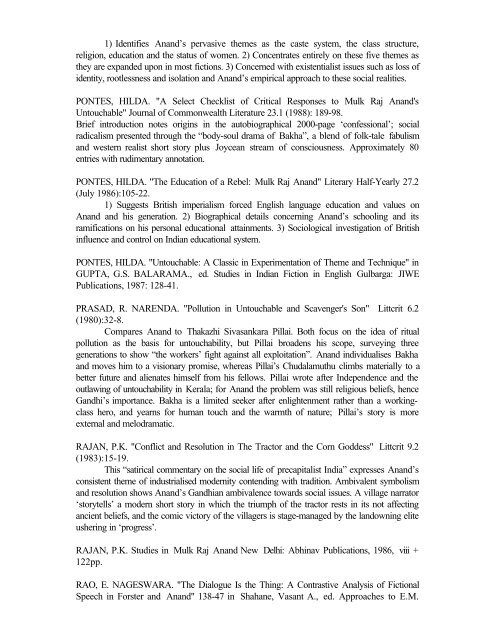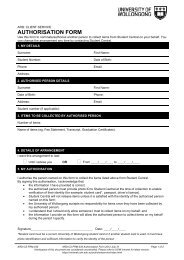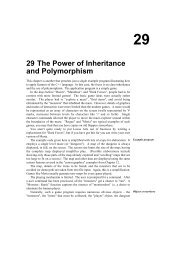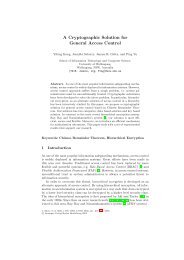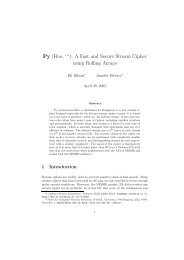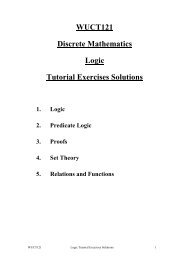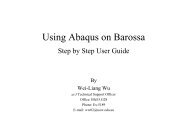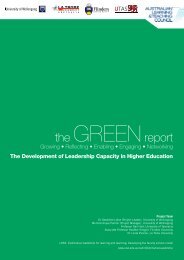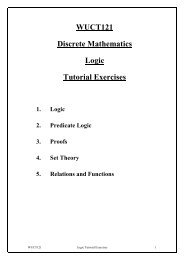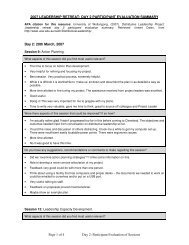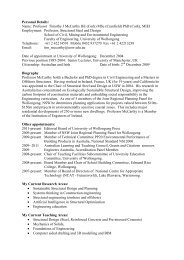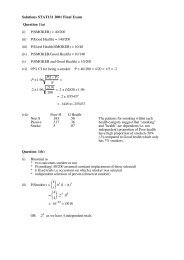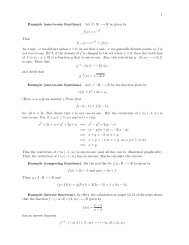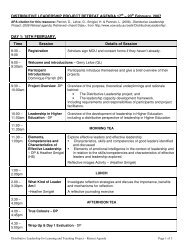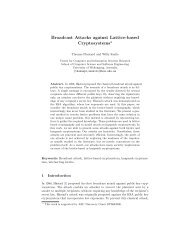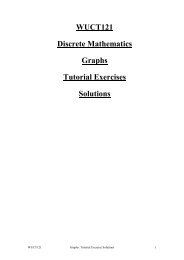india author m 1- a-nan - University of Wollongong
india author m 1- a-nan - University of Wollongong
india author m 1- a-nan - University of Wollongong
You also want an ePaper? Increase the reach of your titles
YUMPU automatically turns print PDFs into web optimized ePapers that Google loves.
1) Identifies A<strong>nan</strong>d’s pervasive themes as the caste system, the class structure,<br />
religion, education and the status <strong>of</strong> women. 2) Concentrates entirely on these five themes as<br />
they are expanded upon in most fictions. 3) Concerned with existentialist issues such as loss <strong>of</strong><br />
identity, rootlessness and isolation and A<strong>nan</strong>d’s empirical approach to these social realities.<br />
PONTES, HILDA. "A Select Checklist <strong>of</strong> Critical Responses to Mulk Raj A<strong>nan</strong>d's<br />
Untouchable" Journal <strong>of</strong> Commonwealth Literature 23.1 (1988): 189-98.<br />
Brief introduction notes origins in the autobiographical 2000-page ‘confessional’; social<br />
radicalism presented through the “body-soul drama <strong>of</strong> Bakha”, a blend <strong>of</strong> folk-tale fabulism<br />
and western realist short story plus Joycean stream <strong>of</strong> consciousness. Approximately 80<br />
entries with rudimentary annotation.<br />
PONTES, HILDA. "The Education <strong>of</strong> a Rebel: Mulk Raj A<strong>nan</strong>d" Literary Half-Yearly 27.2<br />
(July 1986):105-22.<br />
1) Suggests British imperialism forced English language education and values on<br />
A<strong>nan</strong>d and his generation. 2) Biographical details concerning A<strong>nan</strong>d’s schooling and its<br />
ramifications on his personal educational attainments. 3) Sociological investigation <strong>of</strong> British<br />
influence and control on Indian educational system.<br />
PONTES, HILDA. "Untouchable: A Classic in Experimentation <strong>of</strong> Theme and Technique" in<br />
GUPTA, G.S. BALARAMA., ed. Studies in Indian Fiction in English Gulbarga: JIWE<br />
Publications, 1987: 128-41.<br />
PRASAD, R. NARENDA. "Pollution in Untouchable and Scavenger's Son" Littcrit 6.2<br />
(1980):32-8.<br />
Compares A<strong>nan</strong>d to Thakazhi Sivasankara Pillai. Both focus on the idea <strong>of</strong> ritual<br />
pollution as the basis for untouchability, but Pillai broadens his scope, surveying three<br />
generations to show “the workers’ fight against all exploitation”. A<strong>nan</strong>d individualises Bakha<br />
and moves him to a visionary promise, whereas Pillai’s Chudalamuthu climbs materially to a<br />
better future and alienates himself from his fellows. Pillai wrote after Independence and the<br />
outlawing <strong>of</strong> untouchability in Kerala; for A<strong>nan</strong>d the problem was still religious beliefs, hence<br />
Gandhi’s importance. Bakha is a limited seeker after enlightenment rather than a workingclass<br />
hero, and yearns for human touch and the warmth <strong>of</strong> nature; Pillai’s story is more<br />
external and melodramatic.<br />
RAJAN, P.K. "Conflict and Resolution in The Tractor and the Corn Goddess" Littcrit 9.2<br />
(1983):15-19.<br />
This “satirical commentary on the social life <strong>of</strong> precapitalist India” expresses A<strong>nan</strong>d’s<br />
consistent theme <strong>of</strong> industrialised modernity contending with tradition. Ambivalent symbolism<br />
and resolution shows A<strong>nan</strong>d’s Gandhian ambivalence towards social issues. A village narrator<br />
‘storytells’ a modern short story in which the triumph <strong>of</strong> the tractor rests in its not affecting<br />
ancient beliefs, and the comic victory <strong>of</strong> the villagers is stage-managed by the landowning elite<br />
ushering in ‘progress’.<br />
RAJAN, P.K. Studies in Mulk Raj A<strong>nan</strong>d New Delhi: Abhinav Publications, 1986, viii +<br />
122pp.<br />
RAO, E. NAGESWARA. "The Dialogue Is the Thing: A Contrastive Analysis <strong>of</strong> Fictional<br />
Speech in Forster and A<strong>nan</strong>d" 138-47 in Shahane, Vasant A., ed. Approaches to E.M.


